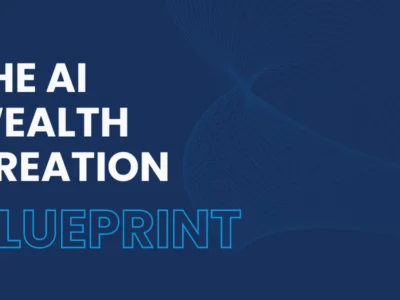Are you ready to unlock the full potential of artificial intelligence and harness its power for Wealth Creation? Look no further! In this article, we will provide you with a comprehensive blueprint to maximize the benefits of artificial intelligence and propel your business towards financial success.
Artificial intelligence has revolutionized industries, from healthcare to finance and beyond. By leveraging the capabilities of AI, businesses can improve efficiency, enhance decision-making processes, and gain a competitive edge in the financial market.
Our blueprint will guide you through the essential steps you need to take to tap into the wealth-creating potential of AI. From understanding the basics of AI to implementing advanced algorithms and machine learning techniques, we will provide you with practical advice and strategies to ensure you make the most of this transformative technology.
Whether you’re a business owner, a tech enthusiast, or simply curious about the possibilities of artificial intelligence, this article is a must-read. Prepare to unleash the power of AI and embark on a journey of wealth creation like never before. Buckle up and get ready to transform your business with the help of artificial intelligence!
Understanding the Impact of AI on Wealth Creation

Artificial intelligence has emerged as a game-changer in the world of wealth creation. Its ability to analyze vast amounts of data, make predictions, and automate processes has opened up new avenues for generating wealth. With AI, businesses can unlock valuable insights, identify patterns, and make informed decisions that increase profitability.
One of the key ways AI contributes to wealth creation is through improved customer experience. By analyzing customer behaviour and preferences, AI-powered systems can personalize marketing campaigns, recommend products or services, and enhance overall customer satisfaction. This personalized approach not only increases customer retention but also drives revenue growth.
Furthermore, AI enables businesses to optimize their operations and streamline processes. AI can analyze data in real-time through automation and machine learning algorithms, identify inefficiencies, and suggest improvements. This saves time and resources and improves productivity, allowing businesses to maximize their output and generate more revenue.
In summary, AI profoundly impacts wealth creation by improving customer experience, optimizing operations, and increasing productivity. By embracing this technology, businesses can gain a competitive advantage and achieve financial success.
Key Applications of AI in Different Industries

Artificial intelligence is being applied across various industries, each with its own unique opportunities for wealth creation. Let’s explore some key applications of AI in different sectors:
Healthcare
- Precision Medicine: AI goes beyond diagnosis and treatment. It delves into analyzing genetic data, enabling highly targeted medication and therapies based on a patient’s unique makeup, and revolutionizing individualized care.
- Clinical Trial Matching: AI tools analyze massive volumes of patient data and research to find suitable candidates for clinical trials, accelerating the development of new treatments and life-saving breakthroughs.
- Mental Health Support: AI-powered virtual therapists analyze speech patterns and offer personalized support for anxiety, depression, and other mental health challenges, providing crucial resources and filling care gaps.
- Wearable Tech Integration: AI, when paired with wearable devices for health monitoring, gives patients and their doctors unprecedented insights into vital signs and long-term health trends, aiding preventative care.
Finance
- Insurance Underwriting: AI helps insurance companies assess risk more accurately, streamlining the underwriting process and personalizing premiums based on individual risk profiles.
- Sentiment Analysis: AI scans news articles, social media, and market data to gauge investor sentiment, helping predict stock market trends or aiding with financial forecasting.
- Data Security: AI systems enhance cybersecurity protocols by detecting anomalies and patterns that indicate potential fraud and intrusions, safeguarding sensitive financial information.
Retail and E-Store
- Visual Search: AI enables customers to search for products using images (like finding a dress in a specific style). This makes product discovery more intuitive and seamless.
- Hyperlocal Targeting: AI combines location data with shopping behaviour to provide offers and advertisements relevant to customers in their immediate vicinity, driving foot traffic and boosting sales.
- Virtual Try-On: AI lets customers superimpose images of clothes, makeup, or accessories onto themselves, aiding purchase decisions and reducing returns.
- Demand Forecasting: AI goes beyond simple inventory control. It analyzes vast datasets, including weather patterns, social media trends, and economic indicators, allowing retailers to stock the right products in the right quantities to match predicted demand.
Manufacturing
- Generative Design: AI explores many design possibilities, suggesting optimized product shapes, layouts, or material compositions, leading to stronger, lighter, and more efficient components.
- Process Control: AI optimizes complex manufacturing processes in real-time, adjusting settings like temperature or speed to reduce waste, improve yields, and maintain consistent quality.
- Assembly Line Collaboration: Collaborative AI-powered robots, or “cobots“, work alongside humans, handling repetitive or dangerous tasks, increasing productivity and safety on the factory floor.
Transportation
- Fleet Management and Logistics: AI analyzes massive datasets of traffic patterns, delivery data, and weather, allowing for optimal route planning, reducing fuel consumption, and enhancing the efficiency of entire fleets and supply chains.
- Predictive Analytics for Air Travel: AI assists airlines with dynamic pricing, scheduling optimization, and predicting passenger demand, leading to improved customer experience and maximized revenue.
- Accident Prevention: AI-powered systems in vehicles and infrastructure can warn drivers of potential hazards, analyze traffic patterns to identify accident-prone areas, and improve road safety overall.
Expanding Horizons
- Agriculture: AI-powered drones monitor crops, AI optimizes irrigation and fertilizer use, and AI-enhanced robots assist with harvesting, increasing efficiency and addressing the challenge of feeding growing populations.
- Art and Creativity: AI tools are used for music generation, image manipulation, and even assisting in Storywriting, pushing creative boundaries.
- Legal: AI aids contract analysis, streamlining document review, identifying legal precedents, and assisting lawyers with complex research.
These are just a few examples of how AI is applied to create wealth in different industries. The possibilities are vast, and businesses in all sectors have the opportunity to leverage AI for financial success.
How AI can Enhance Business Productivity and Efficiency

One of the key benefits of AI is its ability to enhance business productivity and efficiency. By automating repetitive tasks and augmenting human capabilities, AI frees up valuable time and resources, allowing businesses to focus on more strategic initiatives.
AI-powered chatbots, for example, can handle customer inquiries, provide support, and even complete transactions, reducing the need for human intervention. This improves customer satisfaction and allows businesses to allocate their workforce to more complex tasks that require human expertise.
Furthermore, AI can analyze large datasets and extract meaningful insights in a fraction of the time it would take a human analyst. This enables businesses to make data-driven decisions more quickly and accurately, improving efficiency and outcomes.
AI can also optimize resource allocation by analyzing historical data and predicting future demand. This allows businesses to reduce waste, optimize inventory levels, and allocate resources more effectively, ultimately improving productivity and generating wealth.
In summary, AI enhances business productivity and efficiency by automating tasks, analyzing data, and optimizing resource allocation. By leveraging these capabilities, businesses can streamline operations, reduce costs, and increase profitability.
Leveraging AI for Investment and Trading Decisions
Artificial intelligence has revolutionized the world of investment and trading. With its ability to analyze vast amounts of data and identify patterns, AI has become an invaluable tool for investors and traders looking to make informed decisions.
AI-powered algorithms can analyze market trends, historical data, and even news sentiment to predict market movements and identify investment opportunities. These algorithms can process large volumes of data in real-time, allowing investors to react quickly to market changes and capitalize on emerging trends.
Furthermore, AI can help investors manage risk by real-time portfolio monitoring and alerting them to potential risks or anomalies. This allows investors to make timely portfolio adjustments and mitigate potential losses.
In addition, AI can automate trading strategies by executing trades based on predefined rules and market conditions. This eliminates human biases and emotions from trading, leading to more disciplined and consistent trading decisions.
However, it is important to note that AI is not a magic bullet for investment success. It is still crucial for investors to have a deep understanding of the markets and a solid investment strategy. AI should be seen as a tool to augment human decision-making rather than replace human expertise.
AI has transformed the investment and trading landscape by providing investors with powerful tools to analyze data, identify opportunities, and manage risk. By leveraging AI, investors can make more informed decisions, optimize their portfolios, and create wealth.
AI-driven Automation and its Impact on Job Opportunities

The rise of AI-driven automation has sparked concerns about its impact on job opportunities. While it is true that AI can automate certain tasks and potentially replace some jobs, it is important to recognize the new opportunities that AI creates.
AI-driven automation can eliminate repetitive and mundane tasks, allowing employees to focus on more complex and creative work. This not only improves job satisfaction but also enhances productivity and innovation.
Furthermore, AI can create new job roles and industries that did not exist before. As businesses adopt AI technologies, there will be a growing demand for AI specialists, data scientists, and AI trainers. These roles require a deep understanding of AI and provide exciting career opportunities for those willing to embrace this technology.
It is also important to note that AI will not replace the need for human judgment, emotional intelligence, and creativity. While AI can analyze data and make predictions, it still requires human intervention to make strategic decisions, interpret results, and provide context.
In summary, while AI-driven automation may change the nature of certain jobs, it also creates new opportunities and roles. By embracing AI and developing the necessary skills, individuals can position themselves for success in the AI-powered economy.
Ethical Considerations and Challenges in AI Implementation
Ethical considerations and challenges are associated with implementing AI, just as with any transformative technology. It is important for businesses to navigate these issues responsibly to ensure the ethical use of AI and mitigate potential risks.
One of the key ethical considerations is the bias that can be embedded in AI algorithms. AI systems are trained on historical data, which may contain biases and perpetuate social inequalities. It is crucial for businesses to ensure that AI algorithms are fair, transparent, and unbiased by regularly auditing and testing them.
Privacy is another important ethical consideration in AI implementation. AI systems often require access to large amounts of data, including personal information. Businesses must prioritize data privacy and security to protect customer information and comply with data protection regulations.
Additionally, there are concerns about the impact of AI on employment and job displacement. Businesses must proactively address these challenges by upskilling their workforce, providing job transition assistance, and exploring new job opportunities created by AI.
Finally, there is a need for regulation and governance in AI implementation. Governments and regulatory bodies play a crucial role in ensuring the responsible use of AI and protecting against potential harm. Businesses should collaborate with policymakers to develop ethical guidelines and frameworks for AI implementation.
In summary, ethical considerations and challenges in AI implementation are important factors to be addressed. By prioritizing fairness, privacy, and regulation, businesses can ensure the responsible use of AI and mitigate potential risks.
Steps to Implement AI in Your Business for Wealth Creation

Implementing AI in your business can be complex, but the right approach can lead to significant wealth creation. Here are some steps to consider when implementing AI in your business:
- Assess your needs: Identify areas where AI can provide the most value to your business. This could be automating repetitive tasks, improving customer experience, or optimizing operations. Conduct a thorough assessment to understand your needs and prioritize areas for AI implementation.
- Acquire the right data: AI algorithms require quality data to learn and make accurate predictions. Ensure you have access to relevant and reliable data representative of your business and industry. This may involve collecting new data or partnering with external data providers.
- Build AI capabilities: Develop or acquire the necessary AI capabilities to implement your desired solutions. This could involve hiring data scientists, partnering with AI technology providers, or training your existing workforce in AI technologies. Building internal expertise is crucial for successful AI implementation.
- Test and validate: Before deploying AI solutions, thoroughly test and validate them to ensure accuracy, reliability, and fairness. This may involve running pilot projects, conducting A/B testing, or using simulated environments to evaluate performance.
- Monitor and iterate: Once AI solutions are deployed, continuously monitor their performance and iterate as necessary. AI models may need to be retrained or updated as new data becomes available or business requirements change. Regular monitoring and iteration are essential to ensure optimal performance and maximize wealth creation.
- Ensure ethical use: Prioritize ethical considerations in AI implementation by ensuring fairness, transparency, and data privacy. Regularly audit and test AI algorithms to identify and mitigate biases. Protect customer data and comply with data protection regulations to maintain trust and credibility.
By following these steps and taking a strategic approach to AI implementation, businesses can unlock the wealth-creating potential of AI and gain a competitive advantage in their industry.
AI Tools and Platforms for Wealth Creation
Implementing AI in your business does not have to be a daunting task. Various AI tools and platforms are available that can simplify the process and accelerate your journey towards wealth creation. Here are some popular AI tools and platforms to consider:
- Machine learning frameworks: Machine learning frameworks such as TensorFlow and PyTorch provide a powerful foundation for building and deploying AI models. These frameworks offer a wide range of tools and libraries for data preprocessing, model training, and deployment, making it easier to develop AI solutions.
- Automated machine learning (AutoML) platforms: AutoML platforms automate the process of building and deploying AI models, making them accessible to users with limited coding or data science expertise. These platforms handle data preprocessing, feature engineering, and model selection tasks, allowing businesses to develop AI solutions quickly.
- Natural language processing (NLP) libraries: NLP libraries such as NLTK and SpaCy enable businesses to analyze and understand human language. These libraries provide tools for tasks such as sentiment analysis, named entity recognition, and text classification, opening up opportunities for wealth creation in areas such as customer support and content generation.
- Data visualization tools: Data visualization tools such as Tableau and Power BI help businesses gain insights from their data by creating interactive and visually appealing dashboards. These tools enable businesses to explore patterns, identify trends, and communicate insights effectively, leading to better decision-making and wealth creation.
- Cloud AI services: Cloud providers such as Amazon Web Services (AWS) and Microsoft Azure offer a range of AI services that can be easily integrated into your business. These services include pre-trained models for tasks such as image recognition and speech-to-text translation, allowing businesses to leverage AI without extensive development or training.
These are just a few examples of the AI tools and platforms available for businesses looking to implement AI for wealth creation. Depending on your specific needs and resources, there are many options. Evaluating these tools and platforms is important based on cost, scalability, and ease of integration with your existing systems.
Conclusion: Embracing the AI Revolution for a Prosperous Future
Artificial intelligence has emerged as a powerful tool for wealth creation, offering businesses the potential to optimize operations, improve decision-making, and gain a competitive edge. By understanding the impact of AI, exploring its applications in different industries, and considering ethical considerations, businesses can unlock the full potential of AI and propel themselves towards financial success.
Implementing AI in your business requires careful planning, strategic decision-making, and the right tools and platforms. By following the steps outlined in this article and leveraging AI tools and platforms, businesses can navigate the challenges of AI implementation and maximize the wealth-creating potential of AI.
The AI revolution is here, and it is up to businesses to embrace it and harness its power for a prosperous future. Whether you’re a business owner, a tech enthusiast, or simply curious about the possibilities of artificial intelligence, now is the time to unleash the power of AI and embark on a journey of wealth creation like never before. Buckle up and get ready to transform your business with the help of artificial intelligence!
AI Wealth Creation FAQs
Let’s address frequently asked questions about using AI for building wealth:
General AI Wealth Creation
- Can AI really make me rich? AI is a tool, not a magic wealth formula. It can significantly boost your earning potential by giving you an edge in investing, streamlining business processes, or opening up new income streams. However, it still requires knowledge, strategy, and effort.
- How do I get started with AI wealth creation? There are multiple avenues:
- Learn About AI Tools: Explore readily available platforms for stock market analysis, business automation, or content creation.
- Focus on Your Skills: If you have programming or data analysis skills, you can create your own AI-powered tools or offer services to others.
- Network and Seek Mentorship: Find individuals or communities engaged in AI wealth creation to share knowledge and opportunities.
Investing with AI
- What are the advantages of AI-powered investing? AI offers several benefits:
- Data Overload Management: It can process massive volumes of financial data that human analysts couldn’t.
- Pattern Recognition: AI uncovers complex patterns and trends invisible to the naked eye.
- Emotionless Trading: AI-powered systems aren’t influenced by panic or greed, potentially leading to more reasoned investment decisions.
- Are there risks involved? Yes, AI in investing isn’t foolproof:
- Algorithm Limitations: AI relies on the data it’s fed; bad data leads to faulty predictions.
- Overreliance: Blindly trusting AI decisions can be risky. Always use your own judgment.
- Black Box Problem: Some AI systems can be difficult to interpret, making it hard to understand why certain investments were chosen.
AI in Entrepreneurship
- How can AI help me build a business? AI offers numerous applications:
- Marketing Automation: Optimize ad targeting, personalize campaigns, and automate repetitive marketing tasks.
- Customer Service Chatbots: Provide 24/7 customer support and collect valuable customer data.
- Decision-Making Assistance: AI tools can analyze market data, competitor strategies, and internal metrics to aid in strategic business decisions.
- Can AI fully replace human creativity or intuition in business? Not entirely. AI augments human capabilities, but doesn’t eliminate the need for creative solutions, critical thinking, or understanding nuanced business situations.
AI-Driven Content Creation for Income
- How can I use AI for content that earns money? Several possibilities exist:
- AI Writing Tools: Quickly create articles, social posts, and product descriptions.
- Text-to-Image Generators: Create unique images for blog posts, marketing, or stock art to sell.
- AI Music Generators: Create background music for videos, podcasts, or relaxation apps.
- Are there ethical concerns with monetizing AI-generated content? Absolutely. Key considerations are
- Transparency: Be upfront about using AI if your goal is building authentic relationships with an audience.
- Originality: Avoid passing off purely AI-generated content as solely your own creation.
- Copyright and Source Material: Be mindful of how AI tools use existing data.
Discover more from Digital Wealth Guru
Subscribe to get the latest posts sent to your email.








Comments